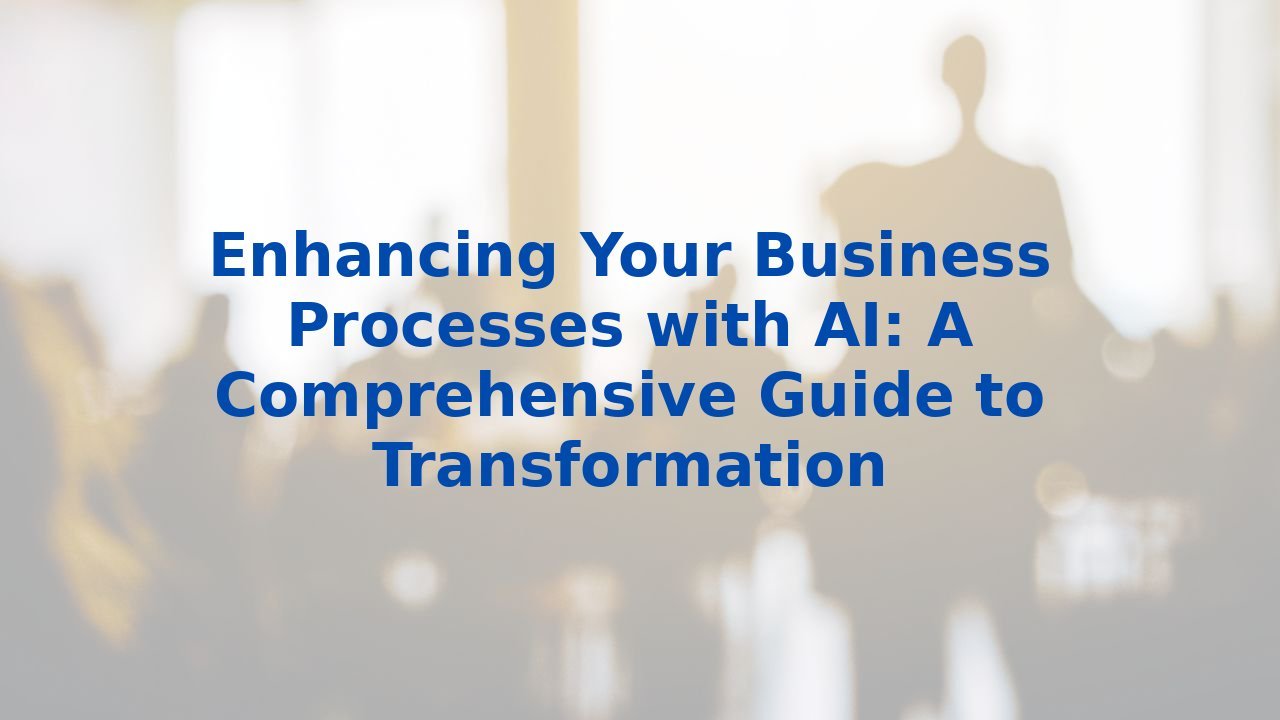Enhancing Your Business Processes with AI: A Comprehensive Guide to Transformation
Enhancing Your Business Processes with AI: A Comprehensive Guide to Transformation
In today’s rapidly evolving business landscape, organizations are vying for a competitive edge and striving for operational excellence. With the explosive growth of Artificial Intelligence (AI), companies have a remarkable opportunity to enhance their business processes in transformative ways. This guide aims to illuminate the pivotal business processes where AI can be a game changer and the vast benefits that come from its integration.
1. Process Discovery and Mapping
The journey towards efficiency begins with understanding existing processes. Here, AI shines by facilitating Process Discovery. Leveraging advanced analytics and machine learning, AI can sift through colossal datasets to uncover inefficiencies that might escape traditional methods. This automated approach not only saves valuable time but also reveals insights that can drive immediate improvements. Techniques like process mining, natural language processing, and pattern recognition unveil the intricate workings of business processes, paving the way for a streamlined operational landscape.
2. Process Automation
Imagine a workspace where mundane, repetitive tasks are no longer a time drain. With the power of Process Automation, AI can deploy intelligent bots to carry out routine duties—think document processing, data entry, and customer inquiries. For instance, intelligent document processing can transform unreadable forms into structured data, eliminating manual intervention. This shift not only reduces errors but also liberates your team to focus on creativity and strategic problem-solving, enhancing overall organizational efficiency.
3. Real-Time Monitoring and Improvement
Gone are the days of reactive management. AI brings the capability of real-time monitoring to the forefront of business process management. By continuously analyzing workflows, AI can promptly identify deviations and potential bottlenecks, facilitating quick corrective actions. This proactive stance fosters a culture of continuous improvement, as organizations benefit from data-driven recommendations and insights that keep pace with the ever-changing business environment.
4. Decision-Making and Risk Prediction
In an age where data is king, AI is the crown jewel of decision-making. AI systems excel at processing both structured and unstructured data from diverse sources, offering a wealth of information necessary for informed choices. By simulating different scenarios and outcomes, AI arms businesses with insights that reveal patterns, allowing leaders to navigate uncertainties with confidence. Predictive analytics further elevates this capability, enabling organizations to stay ahead of market shifts and proactively manage potential risks.
5. Enhanced User Experience
AI doesn’t just transform the back-end processes; it also enhances the user experience. With intuitive interfaces, users at all organizational levels can engage with BPM software without requiring extensive technical expertise. This democratization of technology ensures that everyone—from executives to front-line employees—can harness the power of AI to streamline processes and drive performance.
Benefits of AI in Business Process Management
The integration of AI into business processes is not just a trend; it’s a fundamental shift that holds multiple advantages:
- Improved Efficiency: With automation of repetitive tasks, employees can pivot their focus towards strategic initiatives, fostering innovation.
- Enhanced Decision-Making: Access to comprehensive data insights leads to sharper, more informed choices.
- Reduced Costs: By minimizing manual labor and optimizing processes, companies see a notable decline in operational expenses.
- Increased Productivity: AI serves as a catalyst for productivity, driving teams to perform at their highest potential.
- Better Compliance: Continuous monitoring by AI ensures adherence to regulations, minimizing risks of non-compliance.
The Role of Employee Training in AI Integration
Despite AI's immense potential, the true transformation hinges on skilled individuals who can navigate these technologies. Employee training becomes imperative for the successful adoption of AI.
“A well-trained workforce is essential to tap into artificial intelligence’s full capabilities.”
Understanding AI’s capabilities, interpreting AI-generated insights, and optimizing processes are essential skills that empower employees to thrive in this landscape. Moreover, cultivating adaptability among staff ensures that they are prepared to embrace changes, positioning the organization favorably in a rapidly advancing business world.
Conclusion
Artificial Intelligence is no longer just a buzzword—it's a transformative force that can elevate business processes to unprecedented levels of efficiency and effectiveness. By focusing on process discovery, automation, real-time monitoring, and enhanced decision-making, organizations stand to gain significantly. Yet, to fully capitalize on these advancements, investing in employee training is crucial. As businesses embrace AI, they not only secure a competitive advantage but also foster a culture of innovation and adaptability that sets them apart in their industries. The future of work is here—are you ready to transform your processes with AI?



